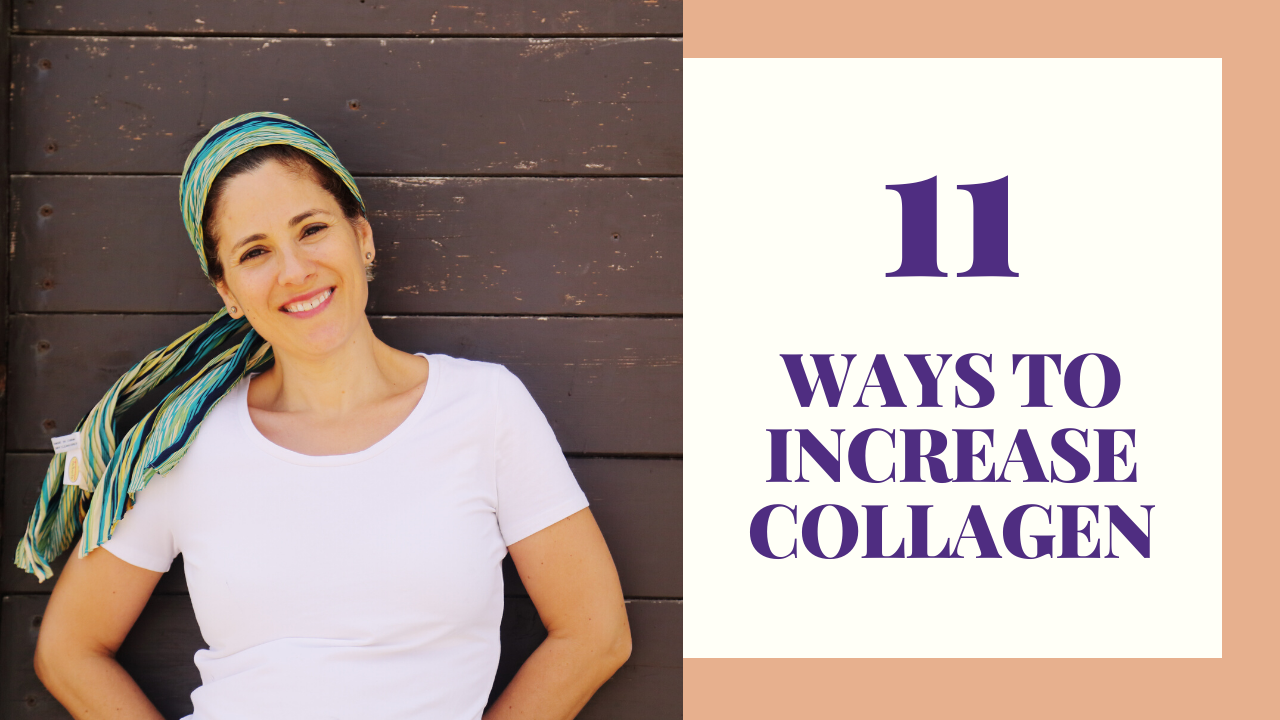11 Genius Ways to Increase Collagen Production in Your Skin
Collagen is the most abundant and strongest protein in your body. It makes up about 75% of the weight of your skin and around a 30% of your total body protein mass.

WHAT IS COLLAGEN
Collagen is the most abundant and strongest protein in your body. It’s formed by the cross-linking and winding together of amino acids to form collagen fibers. It makes up about 75% of the weight of your skin and around 30% of your total body protein mass. Structurally, it’s made up of long fibers of protein that provide strength to the skin and hold it together. Collagen helps the skin cells repair and renew and keeps the skin moist.
There are at least 16 primary variations of collagen in your body and can be found in the connective tissue, tendons, cartilage, ligaments, teeth, bones, the valves of the heart and even the cornea of your eyes. Although your skin contains an abundance of collagen when you are young, the supply decreases as you age, which is why it begins to appear thinner and more wrinkled.
Studies show that applying collagen topically is not helpful in sustaining youthful-looking skin. Because collagen is composed of large protein molecules, it is unable to penetrate the skin making it difficult to penetrate into the deeper layers of the skin. While it may help with hydration levels, if you see hydrolyzed collagen being touted as a topical, miracle ingredient, save your money. Instead, look for products that contain peptides, vitamins, and antioxidants that can boost collagen supplies and restore elastin. Theraderm's anti-aging products are specifically designed to slow the degradation of collagen in the skin.
WHAT DAMAGES COLLAGEN
Now that we know what collagen is, let's take a look at what can damage it. Some of these things are easily changed lifestyle choices, but others are simply out of our control. It is our belief that you control what you can so that the uncontrollables don't get out of hand.
1) Lifestyle and Environmental Stressors
Pollution and free radicals can diminish collagen production and reduce skin elasticity.
2) High Sugar Consumption
It's been shown that sugar increases the rate of advanced glycation end products (AGEs) that damage nearby proteins, weakening collagen and making it dry and brittle.
3) Sun Exposure
UV rays damage collagen found in the dermis, causing it to break down, and creates abnormal elastin fibers to rebuild incorrectly forming wrinkles.
4) Smoking
The combination of chemicals in tobacco smoke damage collagen and elastin. Nicotine also restricts the blood vessels compromising the delivery of oxygen and nutrients to the skin.
5) Autoimmune Disorders
There are some autoimmune that can cause antibodies to target collagen.
6) Natural Aging Process
Collagen levels decrease and deplete naturally throughout our lifespan.
11 GENIUS WAYS YOU CAN BOOST COLLAGEN PRODUCTION IN YOUR SKIN
There are many ways to boost collagen through diet and supplementation.

1. Topical Peptides
Lab-engineered peptides have shown promise as a skin cream ingredient that can stimulate skin growth and repair. Eternox Peptide Creme, Peptide Eye Creme, and Anti-Aging Lip Complex all contain anti-aging peptides that promote collagen production. While growth factors have experienced a huge surge in marketing hype, Theraderm Clinical Skin Care has been getting even better results with a combination of lactic acid and the peptide combination in Eternox Peptide Repair Creme. And for a lot less expensive than products with growth factors! You can read more about that here.
2. Chemical Peels
Chemical peels involve applying a type of "chemical agent" to the skin for the purposes of exfoliating sun-damaged, thickened surface skin while stimulating collagen production for firmer skin. Having peels done on a regular basis (every 6-8 weeks) will lead to collagen stimulation that improves the appearance of wrinkles.
3. Omega Fatty Acids
Protect the collagen in your skin by consuming a balanced diet that contains protein in the form of fatty fish high in Omega-3 fatty acids and vitamin A (which has an anti-inflammatory effect) and contains antioxidants, both of which scavenge free radicals and prevent loss or degradation of collagen.
4. Bone Broth
Regular consumption of bone broth is considered to have nutritional and healing benefits, as the collagen leaches out of the bones during the cooking process. This can also help with inflammation and improve your skin.
5. Limit or Cut the Caffeine
There is evidence that caffeine may have an adverse effect on skin aging and the wound healing process of the human skin.
6. Hyaluronic Acid
This anti-aging ingredient is an important compound for collagen in the skin. Hyaluronic acid has been touted for speeding up recovery time and relieving painful joints. One study suggests that hyaluronic acid can help boost collagen production in the human body. Hyaluronic acid is naturally found in the body, but it decreases as we age. However, without adequate levels of vitamin C, your body will not gain the full benefit of foods containing hyaluronic acid. Theraderm OPC Reparative Serum contains this hydration-boosting ingredient that will help re-establish your collagen base.
7. Vitamin C
Eating foods rich in vitamin C and amino acids can increase the levels of hyaluronic acid and collagen in the body as both are important for skin. Foods that are rich in vitamin C include citrus fruits, papaya, strawberries, broccoli and green, leafy vegetables like cilantro. It can also be taken as a supplement and is best paired with pycnogenol.
8. Aloe Vera
We all know that aloe vera has soothing and calming properties of the skin when applied topically. Recent studies have revealed that extracted aloe sterols taken as a supplement doubled the production of collagen and hyaluronic acid.
9. Antioxidants
Antioxidants protect skin against free radical damage. Certain antioxidants, such as pycnogenol, found in OPC Reparative Serum, enhance the effectiveness of collagen production and rejuvenate the skin. Include green tea, blueberries, licorice extract, mulberry extract, yerba mate, pomegranate extract, astragalus, cinnamon, essential oils of basil, oregano, and thyme in your diet as often as possible.
10. Ginseng
The anti-aging effects of ginseng are well-documented. Ginseng is absorbed into the skin without causing the adverse reactions that many chemical pharmaceuticals cause, and helps skin keep its original shape. It has also been found to promote the growth of collagen. Studies have shown ginseng’s ability to preserve skin against UVB ray damage from the sun. The antioxidants that are released into your bloodstream when you take a ginseng supplement or drink tea that contains ginseng can protect healthy cells and contribute to glowing skin.
11. Algae
Marine plant ingredients are becoming more and more popular as part of beauty routines. This is because most skin damage is caused by “oxidation” — the exposure of your skin to elements like pollution, which can damage cell growth. Algae is able to prevent oxidation from zapping your skin of its elasticity and collagen. Algae is available in most health food stores in the form of oral supplements.
Micronutrients and lifestyle changes that may support collagen formation include:
Anthocyanins – found in blackberries, blueberries, raspberries, and cherries.
Proline – found in egg whites, cheese, soy, cabbage, and meat.
Vitamin A – found in plants like beta-carotene and animal-derived foods.
Copper – found in shellfish, red meat, nuts and some drinking water.
Red light laser therapy - can stimulate and increase the growth of collagen in the skin. It’s a low-level or (LLLT) laser that is non-invasive, safe and can improve skin elasticity and wrinkles.
A regular exercise regime - can help reduce visible aging while protecting collagen and keeping your skin, bones, muscles, and joints healthier for longer.

